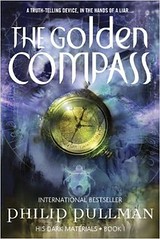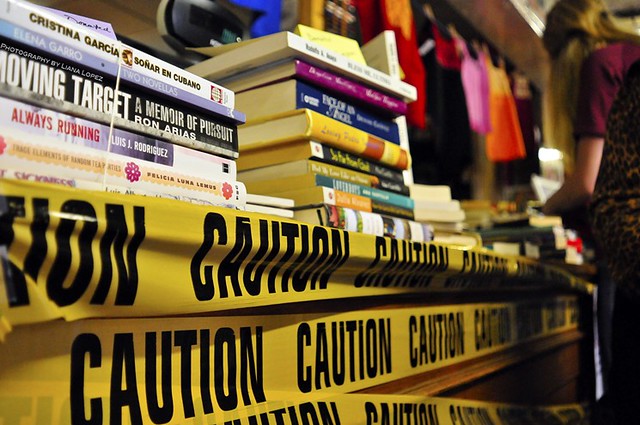You Can’t Read That! is a periodic column featuring banned book reviews and news roundups.
YCRT! News
- A federal judge has ruled that Arizona’s ban on ethnic studies classes (and the associated wholesale banning of books in the Tucson Unified School District) was motivated by racial discrimination, a potentially lethal blow to the ban. I say “potentially” because as of now the ban is still in effect. Stay tuned.
- “The word that he didn’t understand was, ‘masturbate,'” Hampton said. “I was like, ‘What are these kids reading?'” You’ll never guess … oh, wait, yes you will. Sherman Alexie’s “The Absolutely True Diary of a Part-time Indian” takes another bow, this time outraging protective parents in Las Vegas, Nevada.
- Recent attempts to remove “The Handmaid’s Tale” from a Pennsylvania high school’s summer reading list prompt a well-written editorial in support of teaching banned books.
- All copies of a highly-regarded young adult novel, “The Hate U Give,” have been pulled from school library shelves in Katy, Texas, after a parent complained about vulgarity. The censorious parents, apparently, are totally cool with the book’s subject matter: the extrajudicial murder of a black teenager by police.
- M.K. Asante’s memoir, “Buck,” was removed from the reading assignment list at a Baltimore, Maryland, high school after a parent posted excerpts on Facebook, prompting a flood of complaints to school administrators. No word on whether administrators end-ran the district’s challenged book review process, or if the district even has such a process.
- One Million Moms takes aim at Scholastic, one of the world’s largest publishers of children’s books, for “publishing and promoting pro-homosexual and pro-transgender books for children.”
- Here’s an interesting interview with a “porn shop” librarian.
- Speaking of porn and libraries, balancing patrons’ rights to view what they want on library computers with other patrons’ wishes not to be subjected to open displays of pornography is, in the words of this report, a “tough needle to thread.”
- Should libraries be required to include dangerous books in their collections? Is there such a thing as a dangerous book? What about “The Turner Diaries,” “Mein Kampf,” “The Protocols of the Elders of Zion”?
- Not much has been said about how the Federal Communication Commission’s suspension of net neutrality rules will affect the nation’s public libraries. But it will, as this ALA editorial points out.
- I guess it’s okay for high school journalism students to learn about television by broadcasting news to other students over a closed-circuit network, so long as they don’t report news that might make adults uncomfortable.
- By now everyone has heard about the Trump administration directive banning the use of seven words and phrases in Centers for Disease Control reports. It may seem funny at first glance, but it is in fact an existential threat to science.
- Speaking of Trump administration attempts to censor information it doesn’t like, the Department of Health and Human Services is withholding over 10,000 public comments critical of its proposal to roll back regulations on funding religious and faith-based groups.
- Under a directive going into effect in New York, families and friends will no longer be allowed to mail packages or books to prisoners. Instead, they will have to order items from a limited number of authorized vendors, which will then deliver packages to state prisons. Only 77 books are currently available through these vendors: one dictionary, one thesaurus, five romance novels, 11 how-to books, 14 religious texts, 21 puzzle books, and 24 drawing or coloring books.
YCRT! Banned Book Review
 The Golden Compass (His Dark Materials #1)
The Golden Compass (His Dark Materials #1)
by Philip Pullman
![]()
I finished Philip Pullman’s “His Dark Materials” trilogy several years ago, before I started this banned book column, before I’d gotten in the habit of reviewing books. I didn’t need a paper trail to help me remember them as the best young adult adventures I’d ever read, so when “La Belle Sauvage,” the first book of a new Pullman trilogy, “The Book of Dust,” (which builds on the first one) came out late last year, I made sure to read and review it.
This is from my recent review of “La Belle Sauvage”:
“I was literally breathless when I finished the book. How long has it been since I’ve read anything this gripping and engaging? A while, for sure. Oh yes, I read lots of thrillers, and they all have gripping plots, but I always know some bozo like me wrote the book. With Pullman, I forget about the bozo behind the book. When Malcolm’s excited, I’m excited. When he’s frightened nearly out of his wits, so am I. This is how it was when I first discovered my love of reading as a child, when a good book could sweep me off my feet. That Pullman can do that to me as an adult is … well, it’s genius, is what it is.”
You will understand, then, why I am now re-reading (and this time reviewing) the original “His Dark Materials” trilogy. This is my review of the first novel, “The Golden Compass,” which will be followed by reviews of “The Subtle Knife” and “The Amber Spyglass.”
When I first read the “His Dark Materials” trilogy, all three novels were being challenged and in some cases banned from school reading lists and libraries around the country, and were listed on the American Library Associations’s list of frequently banned and challenged books for 2008. As a matter of fact “His Dark Materials” remains on the current ALA list, compiled in 2016.
Objections to the novels center around the books’ portrayal of organized religion. In the world of “The Golden Compass” and the other novels of the first trilogy, the church–very similar to our world’s Catholic church–is strong and repressive, acting in opposition to the values and morals most of us are raised with, manipulative and controlling, more than willing to embrace evil in order to preserve and advance its power. This of course puts organized religion in a bad light, and since the books are meant for young readers, they were and are considered a threat by the Catholic church and religious right conservatives.
My take: the hero of “The Golden Compass,” Lyra Belacqua, is the living embodiment of morality: pure and good in action and thought. Everything she does, knowingly or not, is in direct opposition to the cruel schemes of the Magisterium and the Oblation Board; i.e., organized religion. Philip Pullman claims to be an atheist, but I think he is not that dogmatic: his humans–and only the humans–have dæmons, very near to souls.
My childlike delight in reading these novels has less to do with the books’ message on religion and morality (which which I quite agree) than with the pure joy of reading a grand adventure. A meticulously crafted and detailed alternate world, so like our own yet so different. The beguiling Lyra Belacqua, a heroine no reader can ever forget (or get enough of). Hairbreadth escapes, armored bears, journeys by river and sea, visions of alternate universes in the Northern lights, witches, cliff-ghasts, Mrs. Coulter … and most of all, the dæmons. I totally get Iofur Raknison, King of the Panserbjørnes, who wants nothing more than a dæmon of his own, and my dachshund Mr. B, my constant companion, is no doubt wondering why I’ve started having long one-sided conversations with him.
As to the novel’s “young adult” label: yes, Pullman’s trilogy is meant for young readers, but the books are written at an adult level (by which I mean not just Pullman’s vocabulary but the sophistication and complexity of his ideas), and are as good as the best mainstream fiction. If these novels had not been labeled YA, I would never have known.
